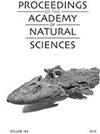阿尔文·卡恩:战后日本的一位科学家
IF 0.5
4区 环境科学与生态学
Q4 BIODIVERSITY CONSERVATION
Proceedings of the Academy of Natural Sciences of Philadelphia
Pub Date : 2019-07-15
DOI:10.1635/053.167.0103
引用次数: 0
摘要
摘要。Alvin R.Cahn(1892-1971)是伊利诺伊大学动物学教授,后来为田纳西河谷管理局从事保护工作。在第二次世界大战后的几年里,他是东京盟军总司令部的工作人员,在那里他撰写了几份关于软体动物的重要报告。本文着重介绍了他的GHQ生涯,特别是他与20世纪日本最重要的软化学家黑田东美(1886-1987)的关系。本文章由计算机程序翻译,如有差异,请以英文原文为准。
Alvin Cahn: a man of science in post-war Japan
ABSTRACT. Alvin R. Cahn (1892-1971) was Professor of Zoology at the University of Illinois and latterly worked in conservation for the Tennessee Valley Authority. In the years following World War II he was on the staff of Allied General Headquarters in Tokyo, where he produced several major reports on mollusks. This paper focuses on his GHQ career and in particular his relationship with Tokubei Kuroda (1886-1987), the most important Japanese malacologist of the 20th century.
求助全文
通过发布文献求助,成功后即可免费获取论文全文。
去求助
来源期刊

Proceedings of the Academy of Natural Sciences of Philadelphia
生物多样性保护-生物多样性保护
自引率
0.00%
发文量
4
期刊介绍:
The Proceedings (ISSN 0097-3157) has been published continuously since 1841. Many volumes are still available in their original printings. Early volumes are unbound, constituting two or three issues per year. Quantities of some volumes may be limited. Early volumes may have slightly soiled cover sheets, but the text blocks are perfect.
 求助内容:
求助内容: 应助结果提醒方式:
应助结果提醒方式:


